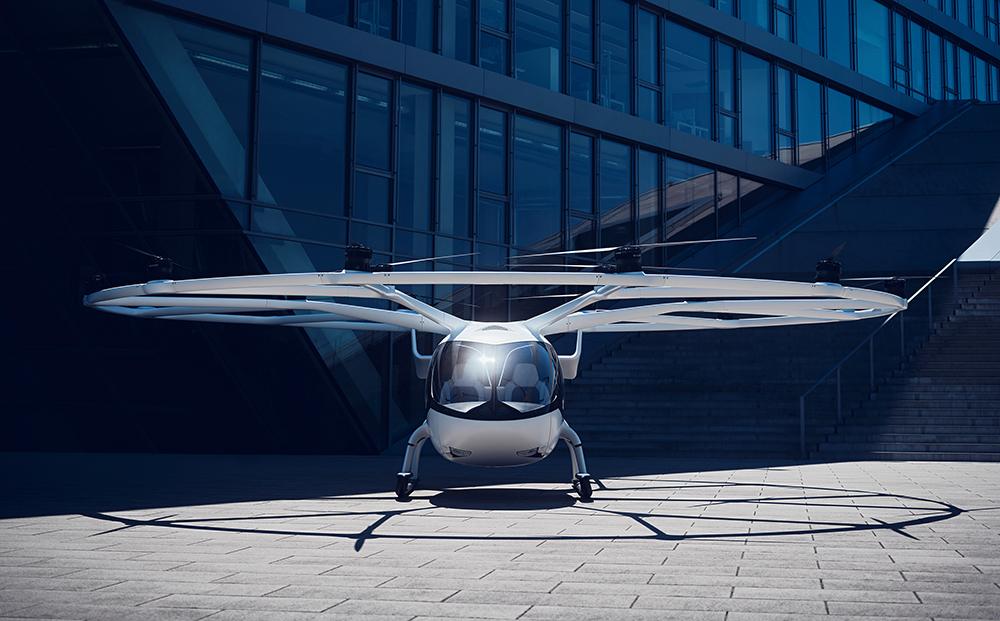
The VoloCity, Volocopter's two-seat electric air taxi.
German urban air mobility startup Volocopter is laying maintenance groundwork for operations of its VoloCity electric-vertical-takeoff-and-landing air taxis, which it aims to begin operating commercially in 2024.
To digitally manage its maintenance operations, Volocopter is turning to MRO software specialist Swiss AviationSoftware (Swiss-AS), whose AMOS software is used by many commercial airlines to monitor and manage fleet maintenance. The companies signed a multi-year contract on May 30 to integrate AMOS into Volocopter’s fleet. The agreement is Swiss-AS’s first collaboration in the urban air mobility segment.
Volocopter will be using AMOS for a wide variety of maintenance operations, including aircraft reliability monitoring and analysis, ensuring continued airworthiness and managing ground staff assignments. The startup also will use the tool for tracking total operating hours, ground handling operations, tool deployment, and dates for component design, purchase, installation and replacement.
Volocopter’s ground technicians also will use the mobile version of the software, AMOSmobile/EXEC, for paperless maintenance operations.
AMOS will act as an interface to VoloIQ, Volocopter’s proprietary digital operating system. VoloIQ will be used to monitor aircraft location, status and battery health, as well as customer-facing services such as booking processes.
“With Swiss-AS as a partner, Volocopter is making strides to ensure that the maintenance of our VoloCity is managed and executed efficiently and foolproof. The AMOS software has a proven track record in the aviation industry—giving us confidence to obtain our Continuing Airworthiness Management Organization (CAMO) and Maintenance Organization Approval (MOA), which is essential for our entry into service,” said Oliver Reinhardt, chief risk and certification officer for Volocopter, in a statement.
Volocopter is pursuing CAMO and Part 145 MOA approvals through the European Union Aviation Safety Agency and Germany’s Luftfahrt Bundesamt. It expects the approvals in mid-2024, after type certification but before entry into service. As part of this process, it already has implemented what it says are the key setup and staffing to perform maintenance on its fleet of test aircraft. During this process, the maintenance team will be able to share experience with Volocopter’s engineering team to ensure the VoloCity can be maintained once it is certified.
According to a spokesperson for Volocopter, it will likely have an in-house technical team for entry into service and the early commercial phase. “One of the main reasons we opened our Bruchsal hangar more than a year in advance before commercial launch is to integrate, test and operate a vertiport, including MRO functions. Training technicians is one of these tasks.” says the spokesperson. During this period, it will test and refine the linking of AMOS and VoloIQ.
Volocopter says decisions about where maintenance takes place will depend on location and size of the vertiports it establishes.
“Typically, we envision the maintenance will take place at the vertiports, but as we scale, maintenance can be done at the vertiport and a regional hangar or hub,” explains the spokesperson. “Routes that include airports could potentially offer a maintenance hub at the airport. We will take the planning step by step while working with our regional partners to identify the most efficient MRO setup.”
Meanwhile, Volocopter says it may consider outsourcing maintenance work as it scales operations and as the industry—including infrastructure—grows, depending on regional needs. “This is still in a discussion phase,” adds the spokesperson.
Swiss-AS has not responded to Aviation Week’s request for comment on how AMOS will be adapted from commercial aviation to the advanced air mobility (AAM) segment.
Several other companies are pursuing development of MRO software for use in the AAM space. Last summer, AAM maintenance specialist Robotic Skies partnered with software developer Continuum Applied Technology to adapt its Corridor MRO software to the AAM market. Embraer’s AAM spinoff, Eve Air Mobility, confirmed in 2021 that it will be using Beacon, the maintenance coordination software platform developed by EmbraerX.




